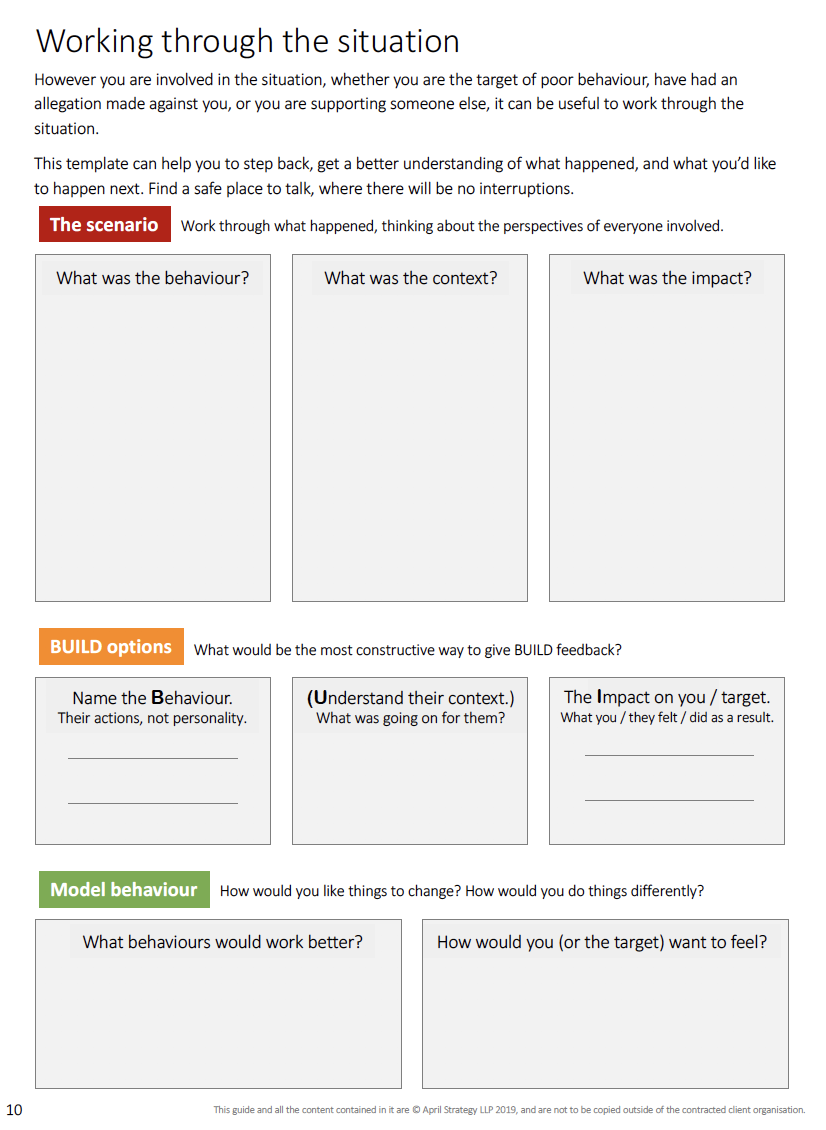Preparing for success
You can prepare yourself for giving great feedback in three ways, which are explained in more detail on this page.
Find your BUILD Buddy
Practice builds confidence
Find somebody to learn and practice BUILD with together. Share your experience with each other. Making mistakes is normal and doing this in a safe environment will help you get better at using it.
- Practice regularly together
- Practice for everyday situations.
- Something that’s happened in the past small and trivial – have some fun.
- Rehearse before you give feedback
- Practice this with someone first
- Plan what you want to say and ensure your feedback is delivered in the most helpful way.
Prepare the conversation
Using all the skills you have learned from this guide, and perhaps from the online e-learning about Speaking Up with BUILD, take a few minutes to plan out the conversation.
How will you describe the behaviour? Make sure it is a fact that can be proven, not a judgment.
Remember they are just a human being too. Step into their shoes to understand what might have been going on for them? What would a reasonable person think about their motives or situation.
How will you describe the impact on you, someone else, the project, etc.
Download and print out this helpful BUILD planning sheet. You may want to do this with a trusted colleague who can help you. Getting the words right makes all the difference.
If you don't feel comfortable giving the feedback directly yourself, you can ask someone else to give feedback on your behalf. Go to the 'Contacts' section of this site to find someone who can help.
Manage your emotions
You may be anxious as a result of the behaviour you experienced or witnessed, or worried about giving feedback - unsure of what their reaction will be.
This is normal. The fear triggers the fight or flight impulse in you. This causes anxiety, and at the same time stops you from thinking straight, as blood is directed from the brain to the body - so you can fight or flee.
The quickest way out of fight or flight is to think Breathe and Brain.
Taking three deep breathes is proven to calm the anxiety caused by fight or flight.
Then you can switch on the higher-level thinking parts of the brain, by asking yourself questions that require thought. Start by asking about your motivation - why do you want to give feedback? What will be the positive result.
Then use this guide to managing your emotions as you progress through the feedback.
Before
Remember your reasons for having this conversation. How might a change make things better? Reminds you why you are speaking up. Builds your MOTIVATION, keeps the discussion on topic.
During
Be kind. Remember you’re doing this to be helpful.
You don’t want to ‘tell them off’. TONE OF VOICE is as important as what you say when giving feedback.
After
Might not be a great outcome. May not recognise the situation or do anything differently. That’s okay. You needed to say something, and you you’ve done what you can. BUILD is giving gift of self-awareness, not immediate behaviour change.
“I JUST THOUGHT YOU MIGHT LIKE TO KNOW.”
Next: receiving feedback as a GIFT